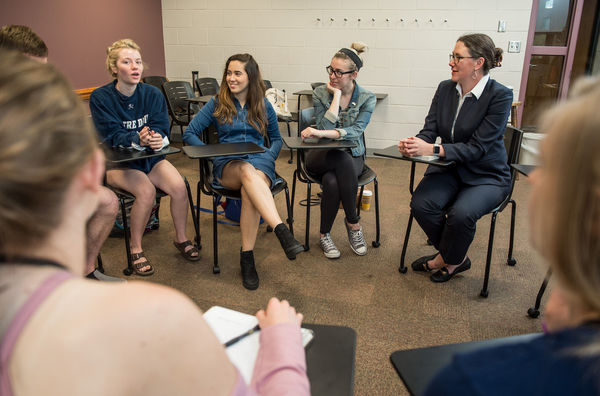Student-Led Dialogue
A dialogue happens when people with different starting points communicate with the aim of achieving mutual understanding. The goal is not always for participants to change each other’s views, but rather for participants to allow themselves to be informed by new experiences, ideas, and relationships. Dialogues are focused on:
- Collaboration and community understanding;
- Uncovering assumptions and biases;
- Looking for shared principles;
- Listening with a view to understanding;
- Articulating differences and conflicts;
- Building intellectual relationships;
- Self-examination and self-discovery. [Learn more at Sustained Dialogue International]
The goal of a classroom philosophical dialogue is to build a focused community where, over the course of the semester, students can better understand their views on the good life, help classmates to do the same, and together identify unanswered questions or opportunities for seeking more evidence. These skills are valuable in themselves, but also increasingly important for career development.
Constructive philosophical dialogue is a skill students and faculty learn with practice and guidance. Indeed, many of the philosophers who write Way of Life texts provide explicit guidance on how to pursue this kind of understanding. Socrates encourages his interlocutors to ask better questions. Aristotle and Plato urge us to consider the role of rhetoric in crafting arguments that are both convincing and ethical. Marcus Aurelius and Rene Descartes both offer models for how to have a better dialogue within one's own thoughts.
Dialogue is a skill we teach students in PWOL courses, and one that importantly translates outside of the classroom. Our project provides two specific opportunities for faculty to build effective dialogue programs into philosophy curricula:
 (Credit: Barbara Johnston, Notre Dame)
(Credit: Barbara Johnston, Notre Dame)
Training in Best Practices for Leading Dialogue: Great classroom dialogues are peer-driven, based on shared norms, and centered on strong questions. Dialogue leaders modeling specific and learnable behaviors to help participants develop these skills. Faculty and students can be trained to lead better dialogues, and some campuses have turned to programs liked Sustained Dialogue to help build their curricula. Mellon Network members will have opportunities for various forms of dialogue training at our summer workshops, as well as access to philosophy dialogue curricula that have been effective at other member schools.
Seed Grants for Peer Dialogue Leader Programs: Network departments provide both formal and informal opportunities for students to develop this skill of leading dialogue. It might happen in specially designed courses, philosophy clubs, internship or teaching assistant programs. We offer grants to select Network members interested in starting peer-led philosophy dialogue programs in their departments. Grants are based on a competitive application process, particularly targeting efforts that connect explicitly to PWOL courses and curricula. Information on applying for these Seed Grants is available here.
"Perceiving that one lives belongs among the things pleasant in themselves, for life is by nature a good thing, and to perceive the good present in oneself is pleasant... Accordingly one ought to share in a friend’s perception that he exists, and this would come to pass by living together and sharing in a community of speeches and thought---for this is what living together would seem to mean in the case of human beings, and not as with cattle, merely feeding in the same place." -Aristotle, Nicomachean Ethics